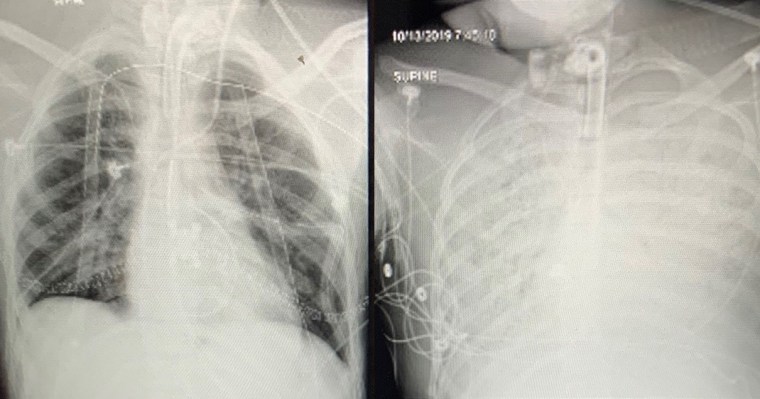A 17-year-old boy is believed to be the first person to receive a double lung transplant because of the vaping-related illness that has sickened thousands nationwide.
Doctors at Henry Ford Health System in Detroit, where the teen was treated, said they had never seen such scarring on someone's lungs from vaping.
"This is an evil that I haven't faced before," Dr. Hassan Nemeh, a thoracic specialist at Henry Ford Health System, said during a news conference Tuesday.
The doctors refused to answer questions about what the boy had been vaping before becoming ill. Instead, they had one message: Stop vaping. Whatever it is — just stop.
"We beg of you," said Dr. Nicholas Yeldo, a critical care physician with the hospital system. "We don’t want to be taking care of you next."
The boy's family chose not to give his name as he recovers from surgery. The family released a statement Tuesday, saying their lives have been "forever changed."
"He has gone from the typical life of a perfectly healthy 16-year-old athlete — attending high school, hanging out with friends, sailing and playing video games — to waking up intubated and with two new lungs, facing a long and painful recovery process as he struggles to regain his strength and mobility, which has been severely impacted," the statement read. The boy turned 17 while in the hospital.
The young man was admitted to Ascension St. John Hospital in Detroit on Sept. 5 with what appeared to be pneumonia.
But when his condition deteriorated a week later, he had to be transferred to Children's Hospital of Michigan. There, he was hooked up to an ECMO machine, which takes over the job of the heart and lungs, pumping and oxygenating the body's blood supply.
It didn't work. His lungs were so badly inflamed and scarred that he needed new, healthy lungs to survive.
The boy "would have faced certain death if it weren't for the lung transplant," Nemeh said.
To get the transplant, the boy needed to be transported again — this time to Henry Ford Health System. The problem was that he would die within minutes if he were taken off the ECMO to make the drive. Ambulances are not equipped with ECMO.
Yeldo described an intense scene as he and his team ran from one doctor to another to try to figure out how to get the teen to them as quickly and as safely as possible. In the end, they needed to switch him to a portable ECMO, which could be taken in the ambulance. They could spare only about eight to 10 seconds to make the risky switch from the hospital machine to the portable one.
On Oct. 15, doctors there were able to transplant healthy lungs from an anonymous donor.

"We are forever grateful to the organ donor and their compassionate family for making the selfless decision to donate the gift of life," the boy's family wrote in the statement.
The young man will be transferred to a rehabilitation center, and, despite doing well, faces a long and arduous recovery.
Patients who have double lung transplants have a median survival of seven years after surgery, but the boy's doctors anticipate he may be able to beat those odds.
"We’re hopeful given his youth and progress that happens in the future that he will be alive and well for a long time," said Dr. Lisa Allenspach, director of the lung transplant program at Henry Ford Health System.
Last week, the Centers for Disease Control and Prevention reported 2,051 cases nationwide of EVALI, as the disease has become known, a number that's sure to grow when the agency updates its weekly case count on Thursday. State health departments across the country are investigating hundreds more potential cases.
Investigators at the CDC reported a breakthrough last Friday, saying they had discovered vitamin E acetate in lung fluid samples of 29 patients from 10 different states.
Vitamin E acetate, an oil, is a synthetic form of vitamin E. It appears to be used as a cutting agent in THC e-liquid as a way to dilute the product. It's been found in half of the 419 THC product samples tested at the Food and Drug Administration. Patients affected by the illness have reported vaping both THC and nicotine.
As solid as the evidence is for vitamin E acetate as a source of the outbreak, it's likely just one of multiple causes.
The FDA has found other diluents, such as medium chain triglycerides and polyethylene glycol, in products. Medium chain triglycerides are sold in oil form as a dietary supplement, and polyethylene glycol is the active ingredient in over-the-counter laxatives.
Follow NBC HEALTH on Twitter & Facebook.

